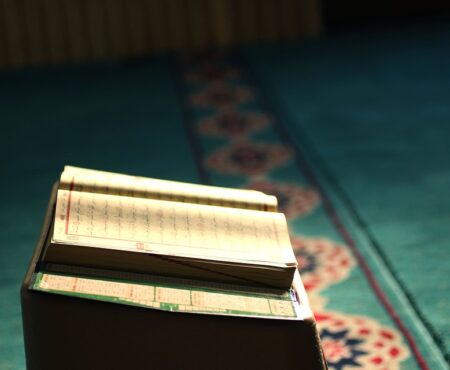Why Do Muslims Fast in Ramadan?
Fasting is one of the pillars of Islam that is well-known beyond Muslim communities; many people are aware of what fasting means, and they also have an immediate association of fasting with Islam and Ramadan. Fasting is one of the obligatory acts prescribed for all Muslims, and is accompanied by a clear set of rules determining exceptions to the compulsory fasting, as well as how to compensate for missed fasts. Fasting is so important that “there is a gate in Paradise called Ar-Raiyan, and those who observe fasts will enter through it on the Day of Resurrection and none except them will enter through it”, according to the Prophet of Islam.
This article will explain the requirement of fasting for Muslims, the way the fasting month of Ramadan is determined, and the benefits listed in the Quran and some traditional narrations for fasting. The reasons for fasting in Islam will also be described.
What is fasting?
Fasting in Islam specifically refers to the daytime fasting, from the time of the morning prayer (around an hour before sunrise), to the time of the “maghrib” prayer in the evening, at dusk. It is obligatory for all mature, mentally-sound and healthy Muslims to undertake fasting during the holy month of Ramadan. Fasting means to abstain completely from food, drink, smoking and sexual relations during daytime. They are also advised to avoid swearing, slander, backbiting and similar sins during the month of Ramadan, especially while fasting. Indeed it is advisable that the person who fasts avoids lying, looking lustfully at others, arguing with others, getting angry, bothering others and oppressing others.
Muslims may fast well into their old age, although some people may be exempt from it if they are ill or unable to due to infirmity or prior health conditions. Some people exempt from fasting, have to make up those fasting days after Ramadan, such as those with a temporary illness during Ramadan. In some cases, a donation called “fidya” to feed the needy is also paid for each day of fasting that cannot be observed.
What time of the year is the month of Ramadan?
Ramadan, the ninth month in the Islamic calendar, occurs at a slightly different time every year, which determines the length of the daylight fasting hours, as well as the daylight hours in the country of the fasting person. Like the other months according to the Islamic calendar, Ramadan starts with the sighting of the new moon, and ends with the sighting of the following new moon. The end of Ramadan is marked by a special celebration called “Eid al-Fitr”, which begins when the new moon of the next month has been sighted.
The main purposes of fasting
In Islam, one of the important reasons for fasting is to become closer to God, and to do so by controlling our desires. Abstention from the above-mentioned actions and things gives a person greater self-control, and in this state, he or she achieves greater proximity to God. Fasting is to achieve piety, and piety in itself is an objective of fasting.
During the fasting, we also become more aware of the hunger and resulting suffering some people in this world undergo, something which should make us more willing to help the needy during this month.
For Muslims it is a divine command that they should fast and refrain from certain habits and actions during Ramadan.In Islamic tradition, Prophet Muhammad had asked of God what the first act of worship was, to which God replied, “The first worship is silence and fasting.”
Many people are also well aware of the health benefits of fasting, for example according to a 2014 study by scientists at the University of California, “fasting for as little as three days can regenerate the entire immune system, even among the elderly.” However that is a topic to be explored another day.
Revelation of the Quran and Ramadan
The month of Ramadan is also the month of the Quran, in which Muslims are encouraged to read a section of the Quran every day, so that by the end of the month, they will have read the entire Quran. It is also recommended that especially during this month, Muslims engage in additional prayer or “dua”, and there are a couple of significant nights during Ramadan, which are the holiest in this month. There are also traditions that describe how the scriptures of Ibrahim, the Torah of Moses, and also the Psalms of David were revealed in the month of Ramadan.
What the Quran says about fasting
The Quran gives a detailed explanation of fasting, and how to observe it, providing answers to commonly asked questions about fasting. The commands referring to fasting are found in the Quran in verses 183 to 185, and verse 187, of Surah Al-Baqarah, the second and longest surah in the Quran.
O you who have faith!
Prescribed for you is fasting
As was prescribed for those who were before you,
So that you may be Godwary.
(Quran, Chapter Al-Baqarah; 2:183)
The Quran also explains the significance of the month of Ramadan;
The month of Ramadan
is one in which the Quran was sent down
as guidance to mankind,
with manifest proofs of guidance and the Criterion.
(Quran, Chapter Al-Baqarah; 2:185)
Some of the spiritual dimensions of fasting
Piety, or “taqwa”, is described as the principal purpose of fasting in Ramadan, and it can be defined as God-consciousness and guarding oneself against displeasing God. Avoiding food, drink and sexual pleasures throughout the day during Ramadan assists the Muslim in becoming closer to God and purifying the soul. According to one of the of the narrations, Ali ibn Abu Talib, the cousin of Prophet Muhammad, said that “God made fasting obligatory to test people’s purity of intention.”
In addition, fasting helps the believer to gain more distance from Satan, as a narration about the Prophet of Islam explains; it is narrated that he said that “fasting is a shield against the Fire.” The month of Ramadan is a month in which it is said the doors of mercy are open for the believers making it a time of repentance, asking God for forgiveness.
Conclusion
In Islam, fasting is seen as having a range of benefits for Muslims. Gaining greater proximity to God, receiving the blessings of God’s mercy and attaining piety is at the heart of fasting. Then there’s the multi-dimensional growth in one’s character that comes from fasting; the gaining of self-discipline by abstaining from that which is normally permissible on top of that which is not allowed. These benefits are among the most-discussed benefits of fasting from an Islamic perspective, excluding the several well-known health benefits of fasting which have been established by research.






Tous les commentaires (0)